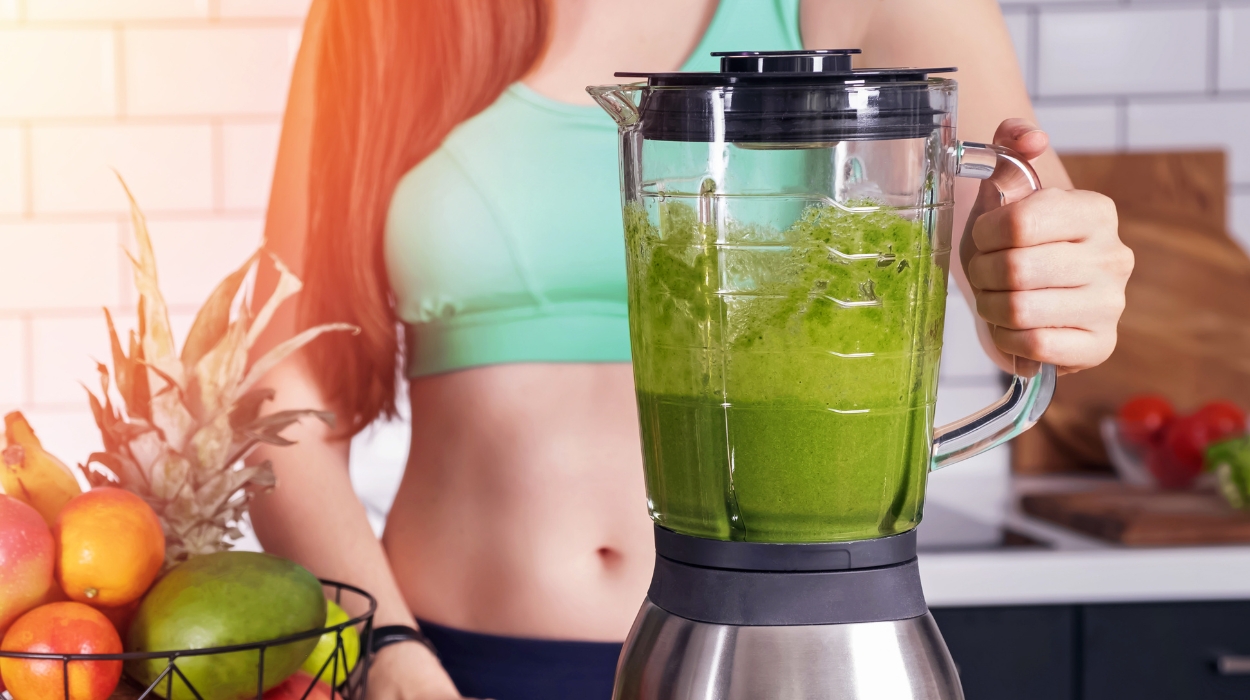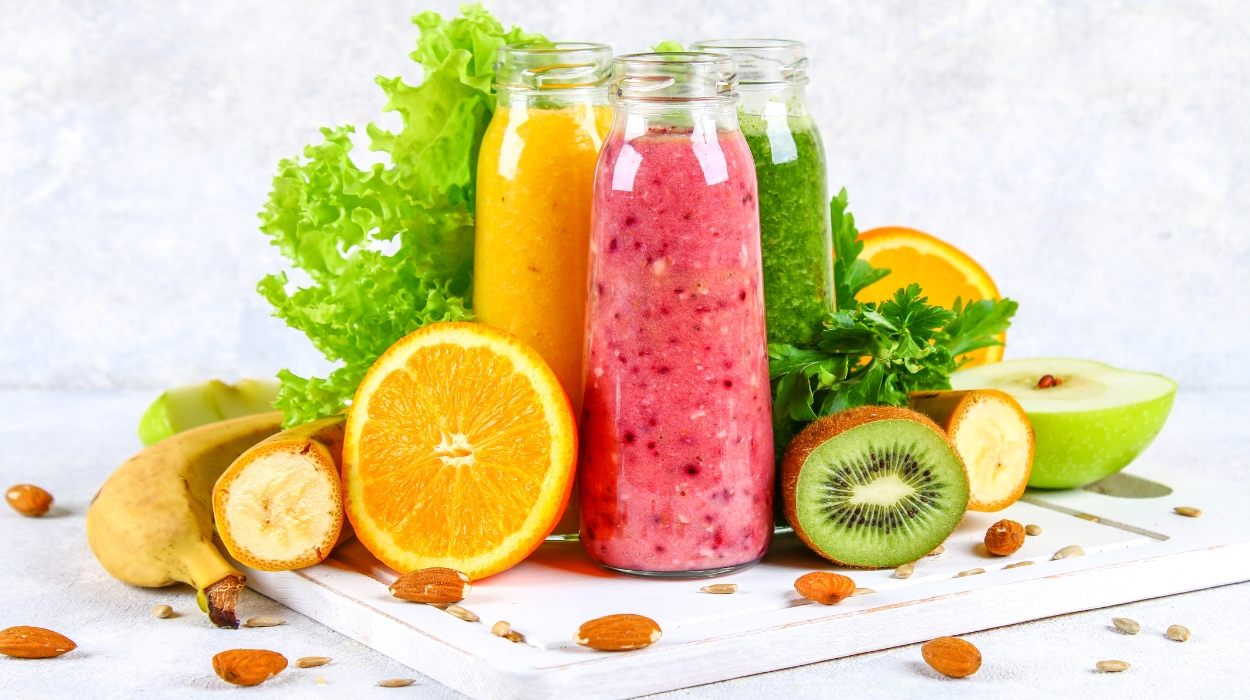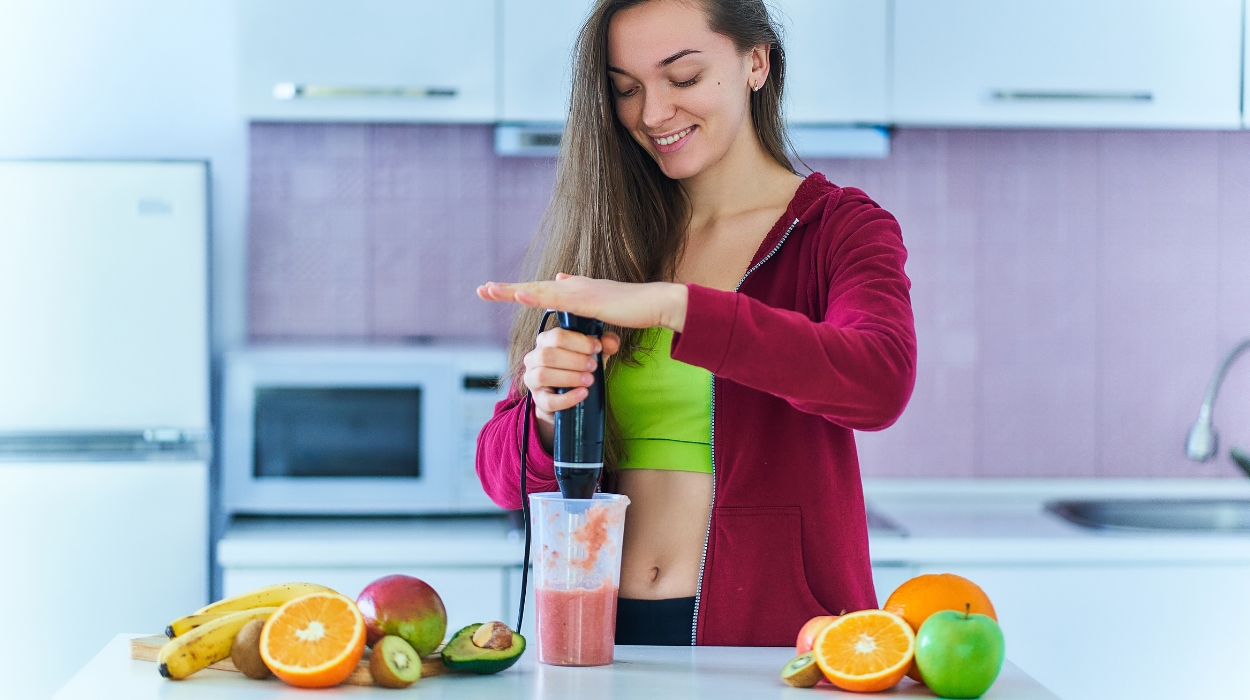Are smoothies good for weight loss? Like most things in life, the answer isn’t a simple yes or no.
Forget the sugary concoctions loaded with processed ingredients, excessive sugar, and hidden calories. We’re talking about smoothie bowls brimming with fresh fruits, vegetables, protein, and healthy fats that keep you energized and on track.
The buzz surrounding the effectiveness of weight loss smoothies has sparked a nutritional revolution. This raises the question, “Should you join the smoothie diet movement or is this another fad you should avoid?”
To answer these questions and more, join us as we explore the science behind these blended concoctions to discover what to put in smoothies for weight loss.
Are Smoothies Good For Losing Weight?
Well, it depends. For smoothies to be beneficial for healthy weight loss, it’s essential to use nutrient-dense, low-calorie ingredients like fruits, vegetables, and protein sources. The bioactive compounds in these blended foods promote satiety and boost metabolism, supporting an effective weight loss journey.
However, it’s crucial to be mindful of portion sizes and avoid excessive sugars, as high-calorie additives could cause weight gain.
Are Smoothies Good For Weight Loss?

Smoothies, beyond their delicious taste and refreshing appeal, offer numerous health benefits that support weight loss. This makes them a popular choice for those trying to lose weight.
But it depends on how you make them and what you put in them. While a smoothie packed with syrups and high-fat yogurt might contribute to weight gain, a carefully crafted blend can be a powerful tool for shedding pounds and keeping them off.
Promotes Satiety
One of the key factors that make smoothies good for weight loss is their ability to promote satiety. This means they can help you feel full and satisfied for longer, reducing your daily calorie intake.
An observational study found that the satiety effects of drinking a fruit smoothie[1] are the same as eating whole fruits equivalent to the drink. Here’s how:
- Fiber: Smoothies are naturally rich in fiber, especially when you blend in fruits and vegetables with their skins intact. Fiber slows down digestion.[2] This keeps you feeling full for longer and prevents hunger pangs.
Ingredients like chia seeds, flaxseeds, or psyllium husk in your smoothie can further boost its fiber content.
- Protein: Adding protein to your smoothie is another great way to boost satiety. Whether animal or plant-based, protein releases hormones that signal fullness,[3] enabling you to resist cravings and overeating.
Good protein sources include Greek yogurt, protein shake powder, nut butter, and seeds.
- Healthy fats: Good fats, such as avocados, nuts, and seeds, influence appetite. These fats slow down the absorption of carbohydrates,[4] preventing blood sugar spikes that often trigger hunger pangs.
Boosts Metabolism
A well-crafted smoothie can enhance metabolic rate, aiding the body in burning more calories faster.
- Thermic effect of food: Certain ingredients like green tea,[5] ginger, red pepper, turmeric,[6] and cayenne pepper[7] contain thermogenic properties. These substances elevate your body temperature slightly, causing it to burn extra calories to cool down.
- Protein punch: Proteins[8] are essential for maintaining, repairing, and growing lean muscle mass. Muscles are metabolically active tissues, meaning they burn more calories at rest. By consuming an adequate amount of protein, individuals can support muscle health, which, in turn, can positively impact metabolism.
Protein also has a higher thermic effect compared to fats and carbohydrates. This means the body expends more calories to digest and process protein-rich foods.
Supports Portion Control
The customizable nature of smoothies supports mindful portioning of healthy fruits, vegetables, and protein sources. Using the right proportions enables you to create a nutrient-dense smoothie that aligns with your weight-loss goals.
What Type Of Smoothies Can Help You Lose Weight?

We now know that when crafting weight-loss-friendly smoothies, we should prioritize whole, unprocessed ingredients, control portion sizes, and incorporate a balance of macronutrients. But what smoothies are good for weight loss? Let’s find out.
Green Smoothies
Are green smoothies healthy alternatives to vegetables? Green smoothies are a hub of healthy vitamins, minerals, and fiber. Adding fruits and veggies like avocado, apples, cucumber, or kiwi enhances the flavor and creates a refreshing and satisfying weight-loss beverage.
Protein-Packed Smoothies
Protein is the satiety king, keeping you feeling full for hours and preventing those pesky between-meal snack attacks. Incorporating ingredients like Greek yogurt, protein powder, or unsweetened nut butter into your smoothies also preserves lean muscle mass during weight loss.
Berry Blast Smoothies
Berries, such as blueberries, strawberries, and raspberries, are not only delicious but also rich in antioxidants and fiber. These elements promote digestive health and fight against inflammation,[9] making berry smoothies a tasty and weight-loss-friendly option.
Detoxifying Smoothies
Ingredients like lemon and ginger[10] can be combined to create detoxifying smoothies. These blends assist in flushing out toxins and support metabolism, making them a valuable addition to a weight-loss diet.
Low-Calorie Tropical Smoothies
Blend tropical fruits like pineapple, mango, and papaya to infuse your smoothies with exotic flavors. These fruits are low in calories and provide essential vitamins and minerals, offering a sweet and satisfying solution for those watching their weight.
Weight Loss Smoothies Recipes
Check out these fresh fruit smoothies for weight loss recipes you can try at home:
GREEN GLOW SMOOTHIE BOWL
- 1 cup chopped kale or spinach.
- 1/2 cup frozen cauliflower florets.
- 1/2 cup pineapple chunks.
- 1/2 cup low-fat milk.
- 1 tablespoon cacao powder.
- 1/4 teaspoon hemp seeds.
- A dash of cinnamon.
Blend until smooth and pour into a bowl. Top with fresh berries, a drizzle of almond butter, and a sprinkle of chia seeds for a vibrant and healthy breakfast smoothie bowl.
TROPICAL PROTEIN POWERHOUSE
- 1 cup unsweetened coconut milk.
- 1/2 cup frozen mango chunks.
- 1/4 cup frozen pineapple chunks.
- 1/4 cup Greek yogurt.
- 1 scoop vanilla protein powder.
- 1/4 teaspoon cinnamon.
Enjoy this tropical treat as a post-workout snack or light lunch. The protein and healthy fats will help you feel full and energized. Remember to observe the protein recommended daily value of 1.2[11] grams of protein per kilogram of body weight when using protein powders.
BERRYLICIOUS BLAST
- 1/2 cup mixed berries (blueberries, raspberries, strawberries).
- 1/2 cup unsweetened almond milk.
- 1/4 cup plain yogurt.
- 1 scoop protein powder.
- 1/4 teaspoon chia seeds.
- A squeeze of fresh lemon juice.
Blend it all up for a protein-packed smoothie with natural sweetness and a burst of antioxidants. Top with fresh berries for an extra visual treat.
CREAMY CHOCOLATE DREAM
- 1 cup unsweetened almond milk.
- 1/2 cup frozen banana.
- 1/4 cup unsweetened cocoa powder.
- 1 tablespoon almond butter.
- 1/2 teaspoon vanilla extract.
- 1/4 teaspoon cinnamon.
- 4 ice cubes.
Blend until smooth and creamy. This decadent smoothie satisfies your sweet tooth without added sugar or excessive calories.
Additional Tips For Weight-Loss Smoothies
- Use low-calorie liquids. Opt for water or unsweetened almond or coconut milk as your base.
- Use fresh or frozen fruits and vegetables in your smoothies.
- Limit added sugars. Embrace natural sweetness from fruits and avoid adding honey, syrups, or other sweeteners.
- Make them yourself, which gives you control over the ingredients and portion sizes.
- Be mindful of portion sizes.
- Don’t rely solely on smoothies. Incorporate exercise and other whole foods into your diet for a balanced approach.
Other Health Benefits Of Smoothies
Now that we’ve answered the question, “Are smoothies good for losing weight?”, let’s explore the other benefits these drinks offer your health:
Nutrient-Rich Powerhouses
Smoothies are a fantastic way to pack a variety of nutrients in a single drink.[12] These nutrients support various bodily functions and promote overall well-being.
Craving an extra dose of vitamin C? Blend in oranges, berries, and kiwis. Need a boost of iron? Throw in some spinach or kale. The possibilities are endless, allowing you to target specific nutritional needs or simply fill in any gaps in your healthy diet.
Supports Proper Hydration
Many smoothie recipes contain hydrating ingredients like water-rich fruits and vegetables, yogurt, or milk. Hydration is crucial for various bodily functions, including digestion,[13] circulation,[14] and temperature regulation.
Using water, coconut water, or cucumber in your blend boosts hydration and dilutes the sugar content, making it a healthier choice.
Enhances Digestive Health
The fiber content in smoothies contributes to digestive health by promoting regular bowel movements and preventing constipation.[15] Additionally, some ingredients like yogurt or kefir contain probiotics, which benefit gut health.[16]
A healthy digestive system is essential for nutrient absorption and overall well-being.
Boosts The Immune System
Fruits like berries and citrus, often included in smoothies, are rich in immune-boosting antioxidants[13] such as vitamin C. These antioxidants also fight free radicals, which damage cells and contribute to chronic diseases, including cancer.
Regularly consuming antioxidants contributes to a stronger immune system, helping the body defend against illnesses.
Source Of Energy And Vitality
The natural sugars in fruits provide a quick energy boost, making smoothies an ideal choice for a workout snack or a revitalizing pick-me-up during a busy day. The combination of carbohydrates, vitamins, and minerals can replenish energy stores and support overall vitality.
Highly Convenient And Customizable
Smoothies are versatile and adaptable to personal preferences and dietary needs. The possibilities are endless, whether you prefer a green smoothie with leafy greens or a protein-packed one with nuts and protein powder supplements.
Are There Any Side Effects?
Just like diet pills or restrictive eating regimens, we must acknowledge the potential downside of smoothies for weight management.
- Liquid calories and satiety: Studies suggest that liquid calories provide less satiety compared to solid food[17] of the same caloric value. This means you might feel hungrier sooner after drinking a smoothie than eating a comparable meal.
- Calorie overload: Adding too many high-calorie ingredients like, full-fat dairy or excessive amounts of fruits can contribute to a calorie surplus, potentially leading to weight gain. High-calorie blends may be your answer if you’re wondering which smoothies are good for weight gain.
- Sugar content: If your store-bought smoothie tastes sweet, avoid it. Some store-bought smoothies contain high levels of refined sugars. This may lead to health issues like insulin resistance and weight gain when consumed in excess.
- Weight regain and meal replacements: Weight loss programs relying solely on meal replacements can lead to higher risks of weight regain after returning to a regular diet.18] This could be due to several factors, such as loss of dietary skills, nutrient deficiencies, and unsustainable restrictions.
- Allergic reactions: Individuals with allergies should be cautious about the ingredients they use. Nut allergies, for example, could pose a risk if nuts or nut-based products are included.
Conclusion
So, are smoothies healthy and good for weight loss? It all boils down to approach. Smoothies themselves aren’t inherently good or bad for weight loss. They’re simply tools, and like any tool, their effectiveness depends on how you wield them.
Filled with the right ingredients and consumed mindfully, smoothies can be a vibrant ally in your weight-loss journey. But blend carelessly, and you might end up with a sugary, calorie-laden concoction that sends your goals spiraling downwards.
The best weight loss smoothies of 2024 prioritize health without compromising taste. For those considering alternatives, exploring what protein shakes are good for weight loss adds another layer to this nutritional journey.
Frequently Asked Questions
Not necessarily. It depends on the ingredients and portion size.
Berries, such as blueberries and strawberries, are excellent fruit smoothie choices. They’re low in calories, high in fiber, and rich in antioxidants, making them perfect for satiety and a nutrient boost.
While no fruit specifically targets belly fat, those high in fiber and low in calories, like berries, grapefruit, and apples, support overall weight loss.
Yes, if they’re low in sugar and paired with protein, enough vegetables, and beneficial herbs or spices. Opt for nutrient-dense fruits, control portions, and avoid excess sugars for effective weight loss support.
 Evidence Based
Evidence Based
